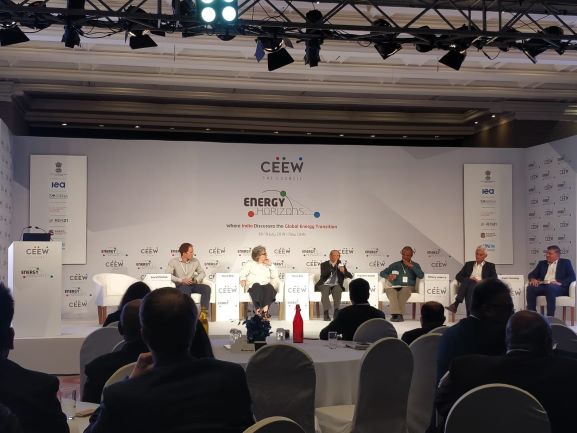Energy Horizons: The Future Is Bright if Storage Costs Follow Solar Trajectory

Energy Horizons, the conference organised by CEEW (Council for Energy , Environment and Water ) in New Delhi had a plenary on electricity systems, and economies of the future. The focus of the discussions was on the future of the power system and over-the-horizon solutions to create a cleaner and smarter grid in emerging economies. Participants included
- Rana Adib, REN21
- Praveen Kumar, Ministry of New and Renewable Energy
- Saurabh Kumar, Energy Efficiency Services Limited
- Thierry Lepercq, Solairestream
- Kadri Nassiep, City of Cape Town
- David Palchak, National Renewable Energy Laboratory
- Tarun Das, CEEW Board (Moderator)
Praveen Kr, Secretary, MNRE presented an optimistic point of view about the future for renewable energy, thanks to the drop in costs. He made the point that the transition of energy will mainly be driven by two things:
- Climate change which is the central driving force, and
- Renewables’ cost and the cost of absorption that will come down as the technological disruptions will enable this in sectors like Electric mobility
He predicted that the energy demand of the country by 2030 will peak to 800 GW out of which 500GW will be RE accounting for roughly 60% capacity, with the caveat that technological challenges remain. The panel was unanimous that the cost of energy storage needs to come down just as solar technology did— only then can truly come into its own vis a vis national grids.
The health of Discoms came up for special attention, especially the new challenges as consumers change into prosumers. The next challenge is grid consolidation, according to panelists and for that technology disruptions are needed. Other issues that came up were Risk mitigation mechanism, Digitization-AI, Block Chain and smart metering.
Rana Adib of REN21 pinpointed the falling investments in the RE sector. She said only 70 countries have a regulatory setup for renewable energy transition which is why only electricity generation is seeing the penetration of RE, whereas its role can be increased in Transportation, infrastructure or other high carbon contributing sectors too.
1) ‘Our #energy systems are undergoing 3 sub transitions – #decarbonisation, #decentralisation and #digitalization, which will together define what our #energy future will look like.’ @Kanikachawla8 kicks-off the first plenary of #EnergyHorizons.
(Visited 377 times, 1 visits today)




